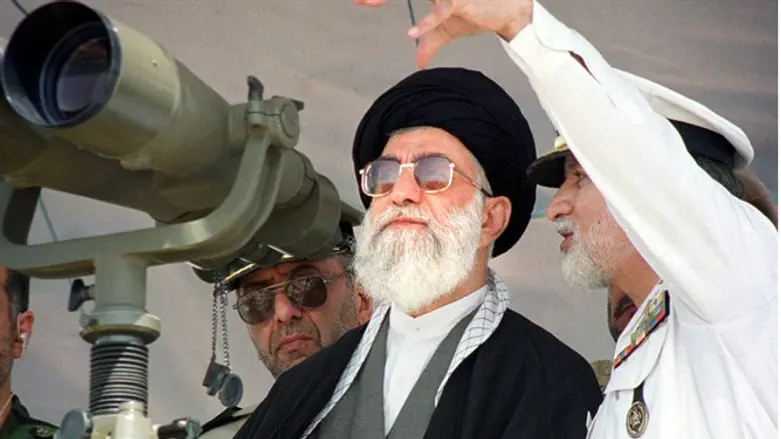
Barely a week after Israel signed peace agreements with Arab Gulf states United Arab Emirates and Bahrain Iran is threatening the two Sunni Arab countries and says it could stage attacks in them to let Bahrain and the UAE pay a price for their “treason”.
Lt. Col. Jonathan Segal of the Jerusalem Center of Public Affairs published an analysis in which he quoted senior Iranian officials who called Bahrain’s decision to make peace with Israel a “shameful decision” and “harmful” to the Palestinian people.
“Undoubtedly, the oppressed and freedom-seeking people of Palestine and the freedom-seeking Muslims of the world will never accept the relations with the usurper and rebellious regime of Israel, and this shameful act will forever remain in the memory of the oppressed nation of Palestine and the freedom-loving nations of the world,” a spokesman for the Iranian Foreign Ministry said.
The unnamed Iranian spokesmen then threatened Bahrain directly over the consequences for the country whenever Israel would take action against Iran.
“An infringement on the security of the region by the Zionist regime (will result in putting) responsibility for such intervention on the shoulders of the Bahraini government,” the spokesman said.
Another Iranian official Hussein Amir-Abdollahian, an advisor to the chairman of the Majlis (Iranian Parliament) warned that Bahrain would be facing “difficult times”.
Abdollahian wrote the following on his Twitter account: The Bahraini regime’s compromise w/ #Israel is a great betrayal to the Islamic cause & Palestinians. The imprudent leaders in UAE, #Bahrain must not pave the way for the Zionist schemes. They should learn lessons from history. Tomorrow is late! The U.S. lifeline has worn out for years.”
The Iranian politician later doubled down on his threats to Israel and said the Israelis would upset security in the Gulf region and that the deal between Bahrain, the UAE and Israel could also threaten the oil supply via the Persian Gulf.
“From the moment the UAE announced that it was normalizing relations with the Zionist entity, any incident – covert or overt – that takes place in Iran or in the region, in which the Zionists are involved – the response will also be directed at the UAE,” said during an interview with Iranian state-controlled television.
While Abdollahian was making his threats the Islamic Revolutionary Guards Corps of Iran (IRGC) called upon the Shiite majority in Bahrein (70 %) to stage an uprising and promised support for such a rebellion by the Quds Force the IRGC’s foreign branch.
“In establishing relations with the Zionist regime against the wishes and ideals of that country’s Muslim nation is a big idiocy void of any legitimacy, and it will receive suitable responses,” the IRGC statement furthermore read.
The IRGC also made clear that the land of Israel would be more unsafe for Israelis and stated that unspecified Muslim-nations would get a “stronger determination” in their goal to “eliminate the cancerous tumor, Israel.”
Shiite opposition groups in Bahrain used similar language to vent their anger about the deal with Israel and vowed to fight any “Zionist presence” in the country.
Bahrain has been regarded by Iran as its 14th Province for centuries until it obtained independence in the 18th century.
During the so-called Arab-Spring Iran tried to support a Shiite uprising against the Sunni regime of Hamad bin Isa Al Khalifa who later became the King of Bahrain. The uprising failed after an intervention by Saudi Arabia, however.
The King now tries to appease the Iranians and said on Sunday the deal with Israel was not directed at any other country, in other words Iran.
"Tolerance and co-existence define our true Bahraini identity...Our steps towards peace and prosperity are not directed against any entity or power, rather they are in everyone's interest and aim for good neighborliness," King Hamad was quoted as saying by BNA.
The commander of the IRGC, Hossein Salami, meanwhile also indulged in heated war rhetoric when he threatened to set US bases in the Gulf region ablaze.
Salami reacted to the American pressure to reinstall biting US sanctions on the Islamic Republic and to pressure members of the UN Security Council to follow suit now that the five-year long arms embargo is going to expire.
“We have thousands of troops on the ground that can occupy and set fire to all US bases in the region if they start to move,” Salami bragged adding that the US army is exhausted and doesn’t have the power to start a ground war with Iran.
Salami’s belligerent rhetoric came after US Secretary of State Mike Pompeo released an official statement about the snapback sanctions in which he said that the greatest threat to Middle East peace comes from the Islamic Republic of Iran.
Pompeo, furthermore, wrote that “The United States took this decisive action because, in addition to Iran’s failure to perform its JCPOA commitments, the Security Council failed to extend the UN arms embargo on Iran, which had been in place for 13 years. The Security Council’s inaction would have paved the way for Iran to buy all manner of conventional weapons on October 18.”
All this took place after Iran, via her proxies in Iraq, is upping the pressure on the US Military by now using roadside bombs to target American convoys while the American embassy in Baghdad’s Green Zone is fired at with rockets almost daily.
The roadside bomb attack was the third one in one week and was staged by one of the Iranian-backed militias in the Hashd al-Sha’abi umbrella organization of pre-dominantly Shiite militias in Iraq.